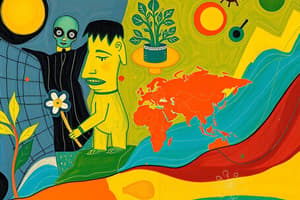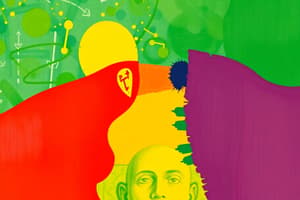Podcast
Questions and Answers
What is the main subject of economics?
What is the main subject of economics?
The study of man in the ordinary business of life
Economics is linked with the study of economic activities in consumption, production, and distribution.
Economics is linked with the study of economic activities in consumption, production, and distribution.
True (A)
What are individuals called when they buy goods?
What are individuals called when they buy goods?
Consumers
What role does a shopkeeper play in economics?
What role does a shopkeeper play in economics?
What are people called when they produce goods?
What are people called when they produce goods?
What is the role of an employee in an economic activity?
What is the role of an employee in an economic activity?
What is the term for someone who pays wages to others?
What is the term for someone who pays wages to others?
What is scarcity in economics?
What is scarcity in economics?
Can you think of an example of economic activities based on your family's choices?
Can you think of an example of economic activities based on your family's choices?
When the current prices go up, what might people need to adjust?
When the current prices go up, what might people need to adjust?
What are some manifestations of scarcity in daily life?
What are some manifestations of scarcity in daily life?
Flashcards are hidden until you start studying
Study Notes
Introduction to Economics
- Economics is described as "the study of man in the ordinary business of life" according to Alfred Marshall, a pioneering economist.
- The subject examines economic activities related to consumption, production, and distribution.
Understanding Economic Roles
- Consumers buy goods to satisfy personal or familial needs.
- Sellers provide goods for profit and may operate as shopkeepers.
- Producers create goods or offer services, contributing to the economy; roles include farmers, manufacturers, doctors, and transporters.
- Employees work for others in exchange for wages or salaries.
- Employers hire workers and provide them with wages, establishing a supply of labor.
Economic Activities and Choices
- Economic activities are performed for monetary gain and reflect the decisions individuals make based on income limitations.
- Scarcity drives economic decision-making as it limits available resources, forcing individuals to prioritize wants.
- Individuals often face challenges when current prices rise, influencing their purchasing decisions.
Scarcity and Its Implications
- Scarcity is fundamental to economics; without it, economic problems wouldn't exist, and the study of economics would be unnecessary.
- Daily life experiences, such as long queues or limited commodity availability, illustrate the concept of scarcity.
- The story of Aladdin symbolizes unrealistic abundance; in reality, desires are often unfulfilled due to limited resources.
Practical Applications
- Personal experiences, such as managing pocket money, reveal how scarcity affects choices.
- Decision-making involves selecting items based on needs and available finances, often influenced by current pricing.
- Encouragement to reflect on family activities helps contextualize individual roles in economic systems.
Studying That Suits You
Use AI to generate personalized quizzes and flashcards to suit your learning preferences.




